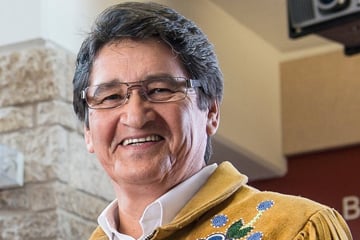
Ovide Mercredi, a former National Chief of the Assembly of First Nations, will receive a Doctor of Laws, honoris causa (LLD) from the Law Society of Ontario.

Ovide Mercredi, a former National Chief of the Assembly of First Nations, will receive a Doctor of Laws, honoris causa from the Law Society of Ontario.
The honorary degree will be presented at the law society’s call to the bar ceremony on June 17 in Ottawa. Each year, the society awards honorary doctorates to distinguished people in recognition of outstanding achievements in the legal profession, the rule of law or the cause of justice, it said in a news release. The recipients will provide inspirational keynote speeches for the new lawyers attending the ceremonies. This year, there will be a total of six awardees.
Mercredi is a Cree born in the northern community of Grand Rapids. He attended the University of Manitoba and graduated with a degree in law in 1977. As a student, he became president of the first Native Students’ Association formed in Canada. He was elected Regional Chief of the Assembly of First Nations for Manitoba in 1989, and he played a critical role in resolving the Oka Crisis in 1990.
From 1991 to 1997, Mercredi served as National Chief for the Assembly of First Nations. During his term, he led the negotiations for the First Nations in the Charlottetown Accord.
Aside from his work as a lawyer and leader of First Nations Peoples, Mercredi is also an accomplished author. An advocate of non-violent methods for change, he has been nominated by the Government of India for the Gandhi Peace Prize. Mercredi was awarded the Order of Manitoba in 2006, and he has received honorary degrees from St. Mary’s University and Bishop’s University.
Mercredi played a pivotal role in the law society’s review of regulatory processes affecting Indigenous Peoples. He worked with leaders and elders of First Nations communities to support residential school survivors in sharing their experiences in a culturally safe, supportive and respectful manner.
Mercredi challenged the LSO to take action to better support Indigenous communities, making important recommendations for a proactive approach toward meaningful reconciliation, including developing cultural competency for lawyers and paralegals who represent Indigenous Peoples and deal with Indigenous issues.
He is currently helping to transform health services for those living in the 49 communities of Nishnawbe Aski Nation in Northern Ontario.